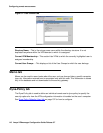
Configuring remote access users
110 Avaya VPNmanager Configuration Guide Release 3.7
Local authentication
Local authentication is used in non-dynamic VPNs, that is VPNs that are not using RADIUS or a
directory server as the authentication database. The user is authenticated from the database
stored in the security gateway’s flash memory. This is the default.
RADIUS authentication
(VPNos 3.x and VPNos 4.31) RADIUS authentication uses an existing RADIUS database for
user authentication.
When this option is selected, you must choose how the remote client configuration download
(CCD) is handled:
● by the security gateway, “Use local database for configuration”
● by the RADIUS server, “Use RADIUS for configuration” (VPnos 3.x only)
● by the directory server, Use LDAP for configuration” (VPNos 3.x only)
LDAP authentication
Note:
Note: This feature is only available for VPNos 3.x, when iPlanet Directory Server is
supported.
LDAP authentication uses the designated directory server database for user authentication.
As with RADIUS, you must also choose how the remote client configuration download (CCD) is
handled:
● By the security gateway, “Use local database for configuration”
● By the directory server, “Use LDAP for configuration”
Dynamic VPNs (VPNos 3.x)
Dynamic VPNs is a term given to VPNs that are readily scalable by maintaining the remote
client database on a RADIUS server (as opposed to maintaining this data in the local security
gateway). This method avoids any size limitations on the number of remote users due to
security gateway Flash memory restrictions.
Depending on your security policy, you may wish to have the VPN session client configuration
download file (CCD, part of dyna-policy) reside in the security gateway while remote client
authentication occurs via the RADIUS database.


















